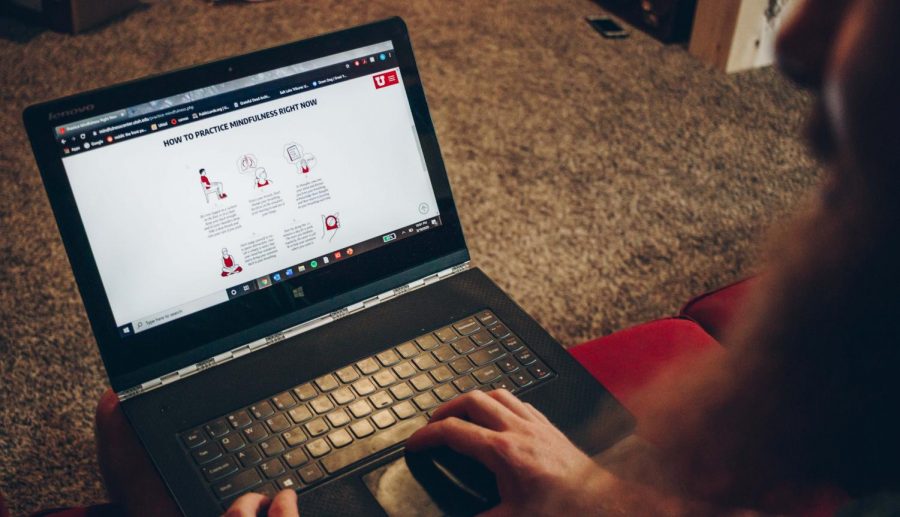Mental Health and the Coronavirus: Challenges and Resources
Quinn Case, a University of Utah undergraduate majoring in PRT, reads the ‘Practice Mindfulness’ page on the University Utah Mindfulness Center website while at his apartment in Salt Lake City on May 19th, 2020. (Photo by Mark Draper | The Daily Utah Chronicle)
May 23, 2020

After three months of COVID-19 directly effecting Americans’ work and social lives, people have also found themselves confronted with a host of challenges that have taken a toll on general mental health.
The Washington Post recently reported that “when diseases strike, experts say, they cast a shadow pandemic of psychological and societal injuries. The shadow often trails the disease by weeks, months, even years.”
The article also emphasizes that research models, based on data collected after detrimental and traumatic historical events, shows a “likely increase in suicides, overdose deaths and substance use disorders.”
Lauren Weitzman, director of the University of Utah’s Counseling Center, said anxiety has increased among students and staff as they are dealing with uncertainty about the pandemic and fear about the health of themselves and their loved ones.
“It’s traumatic in lots of different ways,” Weitzman said.
For Claire Hillard, a recent communication graduate from the U, isolation and quarantine has been one of the main obstacles she has faced during this pandemic.
“I’ve found, for me and the people I’m close with, what we’ve been struggling the most with is being so physically distanced from the people that we love,” Hillard said.
Hillard said other challenges she and her peers have faced due to the pandemic are the loss of the set schedule of in-person classes, increased stress levels due to job changes or unemployment and limited options for general coping strategies, like exercise and physical activity.
While students cannot walk into the counseling center for an appointment at this time, they are offering remote mindfulness workshops available to all students, including out-of-state students. Workshop topics include learning how to cope with anxiety and depression as well as work-life balance.
In addition to the workshops, drop-in mindfulness sessions take place every Tuesday. No formal intake is required to participate in the workshops or sessions.
Other resources available to students include guided meditations, a guide to practice mindfulness and over-the-phone crisis support during business hours with on-call crisis counselors. The counseling center also has a website dedicated to resources available during COVID-19, such as financial resources, food resources or fitness resources.
Due to licensing regulations, counseling sessions are only offered to students currently residing in Utah, but counseling center staff members can aid out-of-state students in finding available local resources.
Before, the credit minimum to receive counseling services from the counseling center was 12 credit hours. The minimum requirement has now shifted to one credit hour. For students seeking to begin counseling, the counseling center will begin intakes for new clients remotely once a secure and confidential system is in place.
Weitzman said the counseling center advises students to “get back to basics,” such as establishing a set routine, trying to go to sleep and wake up at the same time each day, getting some kind of physical activity and spending time outside and offscreen.
“It’s this balance between getting support, staying connected with people in your life, but also making sure you get off, get unplugged and get outside as well,” Weitzman said.
She also recommended checking in on eating habits, eating regular meals and reducing alcohol intake if possible.
Hillard believes one of the most powerful things we can do is figure out what things bring us peace and making sure to find time to do those things.
“It’s really rough. There’s going to be ups and downs, but the more we can be there for ourselves and others, the better we’re all going to be by the end of this,” Hillard said.








